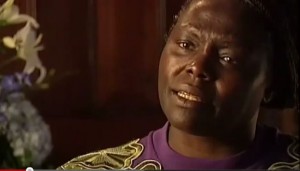Wangari Muta Maathai (1 April 1940 – 25 September 2011)
The Tree Lady of Africa
Kenya has declared two days of mourning in honour of Wangari Maathai, Africa’s first woman Nobel peace laureate, who died on Sunday of cancer. President Mwai Kibaki also announced that Maathai will be accorded a state funeral.
Messages of condolence have been pouring in from across the world in honour of this dynamic woman who inspired so many and was to become known as “the Tree Lady of Africa”.
Maathai was the driving force behind the pioneering Green Belt Movement that organised rural women in Kenya to plant trees, teaching them that not only would this combat deforestation and soil erosion but it would also help generate local income, education and resources.
Since 1977 more than 40 million trees have been planted.
Environmental and Political Activist
Environmental and political activist Wangari Maathai was born in Ihithe, a village in the Central Highlands of Kenya in 1940, where she began her education. She later studied as a boarder at the Mathari Catholic Mission in Nyeri, becoming fluent in English. Completing her education there with the highest grades in her class, she was granted admission to the only Catholic high school for girls in Kenya, Loreto Girls’ High School in Limuru.
Airlift Africa
She was one of about three hundred Kenyans chosen to study at American Universities, in September 1960 under a program funded by the then United States Senator, John F. Kennedy through the Joseph P. Kennedy Jr. Foundation. This initiative was to become known as the Kennedy Airlift or Airlift Africa.
She studied in the United States at Mount St. Scholastica and the University of Pittsburgh, where she first experienced environmental restoration as environmentalists in the city were pushing to end the city’s air pollution.
Having completed her studies in America, she returned to Kenya to a job as research assistant to a professor of zoology at University College of Nairobi.
She arrived to find her post had been given to somebody else, something she believes was because of gender and tribal bias.
After a job search of two months, Professor Reinhold Hofmann, from the University of Giessen in Germany, offered her a job as a research assistant in the micro anatomy section at University College of Nairobi.
In 1967, Hofmann encouraged her to study further in Germany, in pursuit of her doctorate. She studied both at the University of Giessen and the University of Munich
First East African Woman to Receive PH. D.
In 1971 when she was granted a Doctorate of Anatomy at the University College of Nairobe, she became the first East African woman to receive a Ph.D.
During the 70s she became involved in various civic organizations including the Kenya Red Cross Society, the Kenya Association of University Women, the Environment Liaison Centre and the National Council of Women of Kenya.
Through her experience with these various voluntary organizations she realized that the root of most of Kenya’s problems was environmental degradation.
The Green Belt Movement is Born
On June 5, Maathai led a procession of the National Council of Women in Kenya (NCWK) from Kenyatta International Conference Center in downtown Nairobe to Kamukunji Park on the outskirts of the city where they planted seven trees in honour of community leaders. This was the first “Green Belt” of what was to become the “Green Belt Movement”, an environmental non-governmental organization focused on the planting of trees, environmental conservation, and women’s rights.
2004: First Environmentalist to Win the Nobel Peace Prize
In 2004 she became the first African woman and the first environmentalist to win the to receive the Nobel Peace Prize for: “her contribution to sustainable development, democracy and peace.”
The Norwegian Nobel Committee announced:
“Maathai stood up courageously against the former oppressive regime in Kenya. Her unique forms of action have contributed to drawing attention to political oppression – nationally and internationally. She has served as inspiration for many in the fight for democratic rights and has especially encouraged women to better their situation.”



